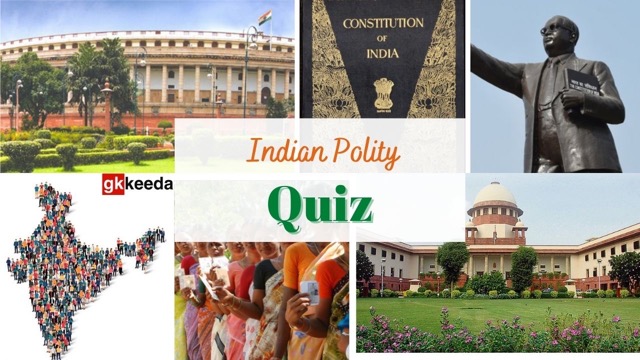Indian Polity

Indian Polity Quiz covers: Constitutionalism, Historical Underpinnings, Evolution & Making of the constitution, Features and Significant Provisions, Political systems, Democratic & Non-Democratic, Parliamentary & Presidential, Unitary & Federal, Direct and Representative, Republic, and Monarchy, the Preamble, The Union and its Territory, Citizenship, Fundamental Rights, Directive Principles, Fundamental Duties, Amendment of Constitution, Basic Structure of the Constitution, Emergency Provisions, Central Government, State Government, Judiciary, Indian Federalism, Local Government, Constitutional bodies, statutory bodies, non-constitutional bodies, etc.
1. The President of India possesses which of the following powers:
- Executive Powers
- Judicial Powers
- Financial Powers
- Military Powers
Select the correct answer:
(A) 1 and 2 only
(B) 2 and 3 only
(C) 2, 3, and 4 only
(D) 1, 2, 3 and 4
Show Answer
Correct Answer: (D)
Explanation:
Powers enjoyed by the Indian Presidential are:
- Legislative powers
- Executive powers
- Judicial powers
- Financial powers
- Diplomatic powers
- Military powers
- Emergency powers
2. Consider the following statements:
- The Cabinet implements the decisions taken by the Council of Ministers.
- The Council of ministers is a much wider body whereas the cabinet is a smaller body
Which of the statements given above is/are correct?
(A) 1 only
(B) 2 only
(C) 1 and 2
(D) Neither 1 nor 2
Show Answer
Correct Answer: (B)
Explanation:
About the Council of Ministers
- It is a wider body consisting of 60-70 members.
- It includes all categories of ministers, that is Cabinet Minister, Minister of State, and Deputy Minister.
- The Council of Ministers implements the decisions taken by the Cabinet.
- Its functions are determined by the Cabinet.
- It is a constitutional body, mentioned under Articles 74 and 75.
About Cabinet
- It is a smaller body consisting of 15 to 20 members.
- It includes only Cabinet rank ministers.
- The cabinet as a body meets frequently and has collective functions.
- The cabinet guides the Council of Ministers by taking policy decisions that are binding on all ministers.
- It supervises the implementation of its decisions by the council of ministers.
3. Which of the following provisions are included in the Representation of People Act, 1951
- Qualification and disqualifications for membership of the houses.
- Corrupt practices and electoral offenses
- Registration of political parties
- Election Disputes
Select the right code
(A) 1, 2 and 3
(B) 2, 3 and 4
(C) 1, 3 and 4
(D) 1, 2, 3 and 4
Show Answer
Correct Answer: (D)
Explanation:
The Representation of People Act 1951 is provided for
- Conduct of election of Houses of Parliament and State legislature;
- Qualifications and disqualifications for membership of both houses;
- Corrupt practices and offenses in connection with the election;
- Disputes related to elections.
4. For filing PIL, the Supreme Court of India invokes the jurisdiction under them:
(A) Original Jurisdiction
(B) Advisory Jurisdiction
(C) Writ Jurisdiction
(D) Appellate Jurisdiction
Show Answer
Correct Answer: (C)
Explanation:
- Public Interest Litigation (PIL) was introduced in the 1980s and Justice V.R. Krishna Iyer and Justice P.N. Bhagwat played a major role in it.
- It can be filed before the Supreme Court (SC) under Article 32 or before the High Court under Article 226 of the constitution.
5. Which of the following statement is incorrect regarding the qualifications for elections as President?
(A) He should be qualified for election as a member of the Rajya Sabha.
(B) He should have completed 35 years of age.
(C) The person should not hold any office of profit.
(D) The person should be a citizen of India.
Show Answer
Correct Answer: (A)
Explanation:
For the presidential election, the person should be qualified for election as a member of the Lok Sabha.
For the Vice President election, a person should be qualified for election as a member of the Rajya Sabha.


No Comment! Be the first one.